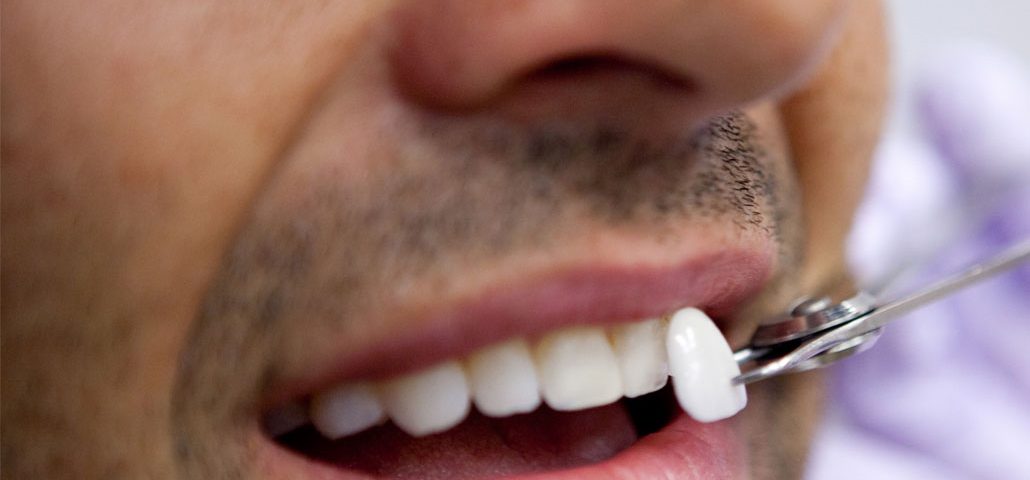Frequently Asked Questions About Veneers

Dr. Sandeep Sachdeva – New Westminster Dentist
September 19, 2017
Milburn Dental Office
September 21, 2017What happens to my teeth after veneers, and will I ever get cavities? The integrity of veneered teeth is only marginally compromised, and the veneer is bonded to the existing teeth. There is no higher incidence of decay provided the veneers are properly cared for as previously mentioned with regular flossing and brushing with toothpaste. In general, it is good dental advice to keep your sugar consumption low and confined to meal times to prevent decay.
How long will porcelain veneers last? They can last from seven to twenty years. While the veneer itself is inert and non-living, the tooth or teeth to which they are attached and the surrounding gum tissues are living and may change. For example, gum line shrinkage may expose or reveal root surfaces. If a veneer comes off it can generally be rebonded. If it chips it can sometimes be rebonded or otherwise replaced.
How Do I Choose a Dentist for Porcelain Veneers? As with any elective procedure, the most important factor in choosing a doctor is experience. While any dentist can offer porcelain veneers, not all have additional training in cosmetics. This is where things can get tricky and research (before and after pictures) becomes even more important.
Do Porcelain Veneers Look Fake? Individual results vary, but the goal is for the porcelain veneers to look and feel like a person’s own teeth, only better. To avoid the too-straight, too-white appearance that many associate with obvious veneers, intentional imperfections like slight rotation, subtle discoloration, and grooves can be made to imitate natural flaws.
A successful case is the result of great teamwork between a dentist and lab technician. The dentist must design the case for long-term success and the ceramist must create custom works of art to give a beautiful and natural look. Cosmetics is not taught in dental school, so it’s important to find a dentist that has extra training and certification showing this education. Experience counts.”
Can Veneers Be Removed? Because some tooth structure and enamel are removed prior to placing veneers, this is considered an irreversible treatment. Veneers may be replaced, but removing them for good will leave your teeth permanently scarred, at high risk for damage, and unhealthy looking.
What are the advantages of porcelain veneers over other types of cosmetic dental bonding procedures? Porcelain veneers are superior to other types of cosmetic dental bonding procedures in several ways:
- Veneers look very life-like
- Veneers are highly stained resistant
- Since porcelain is a ceramic, stain-producing products such as coffee, tea, and red wine will roll right off the surface of your teeth. This means after your porcelain veneers are placed, you don’t have to worry about making changes to your lifestyle to accommodate your beautiful teeth.
If my teeth are reshaped for veneers or crowns, what will they look like? Will they be sensitive? Generally, cemented restorations, such as crowns or veneers (see the procedure section), will require two visits: one to shape the teeth and one to cement the restorations to the teeth. Between visits, your dentist can place attractive provisional restorations to help prevent sensitivity, allow limited function, and provide a nice smile. These temporaries are designed to be in your mouth for a limited time, but should be comfortable and natural looking until your new smile is completed.
Do porcelain veneers stain with normal things like tea, coffee and wine? Porcelain veneers should never stain; however; if your teeth have a propensity to stain you should try to avoid or minimize the behaviours that lead to staining and look after them as recommended above with normal hygiene and maintenance procedures.
How do I get veneers to match my other teeth? This concern will be addressed by your dental professional. Most people get their veneers in a whiter shade than their natural teeth and then under tooth whitening to create a matching esthetic.
How do I take care of my veneers? Once applied to your teeth, porcelain veneers should be treated just like your natural teeth. Don’t miss your twice-annual visits to the dentist for a professional cleaning and dental exam. And be sure to brush and floss daily to clean your teeth properly. There is no special treatment needed to care for your veneers.




